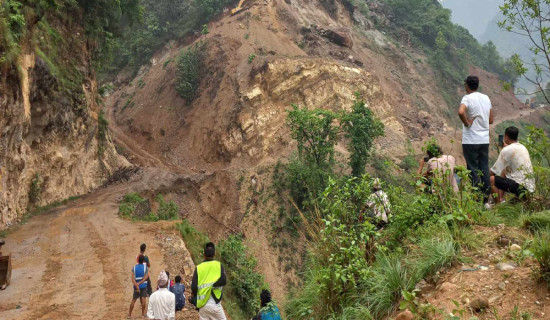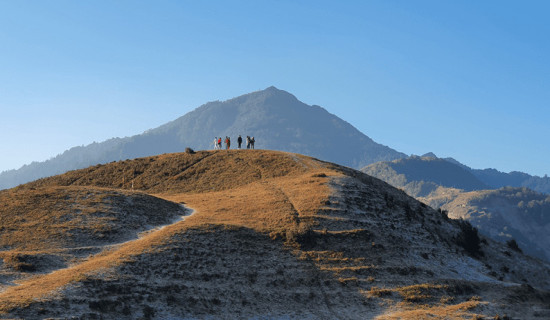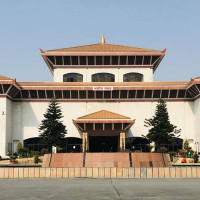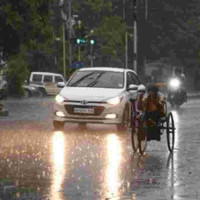- Tuesday, 17 June 2025
Dashain is here, let's savour meat with care for health
By Aashish Mishra & Ajita Rijal,Kathmandu, Oct. 22:The mention of Dashain brings a few things to mind, meat being one of them.
Meat dishes seem to be a staple of this festival, although the type of meat people consume depends on their ethnic, religious and dietary orientations.
As reported by The Rising Nepal’s staff reporter Laxman Kafle in his article 'Exceeding Meat Consumption In Dashain' published on Friday, Nepalis feast on meat, especially mutton, worth over Rs. 100 billion over the 15 days of Dashain.
Although there are no official statistics for the total quantity of meat eaten in Dashain, Nepal’s biggest religious festival, the Department of Livestock Services estimates that around 4 million goats will be killed for meat across the country in this period. This is over 75 per cent of the total number of goats consumed in Nepal in the entire year.
But why do people prioritise meat so greatly in Dashain? Historian Mahes Raj Pant believed it was because of the occurrence of animal sacrifices. “Many animals are sacrificed in Dashain. Perhaps that led to the development of a culture of meat consumption,” he told The Rising Nepal.
He added that Hindu scriptures frowned upon the act of eating meat unless obtained from sacrifices. “Only the flesh of animals first offered to deities can be eaten,” he said, elaborating on the link between animal sacrifices and meat-eating during Dashain.
Culture Expert Om Dhaubhadel felt that the preference for meat could be because of the richer taste it has this time of the year. “Animals are healthier during Dashain after having grazed on the lush green vegetation of the monsoon. Thus, the dishes made from their meat taste better.”
In the Kathmandu Valley, the emphasis on meat is also because Dashain, or the Mohani Nakha, is a customary follow-up to Yenya, or Indra Jatra, Dhaubhadel explained. “Indra Jatra is a festival marked by heartily tucking into Samay Baji. And, in the Newa society, Samay Baji needs to be followed by a feast.”
“Dashain is that feast,” he said.
As a feast, Dhaubhadel said that Dashain dishes included a wide range of food items. “But yes, a special focus is placed on meat.”
Meat was favoured even more in the past as Dashain was almost the only time of the year people could have it. As 82-year-old Sita Aryal of Budhanilkantha remembered, "Meat was a treat, saved for special occasions like Dashain, Chaite Dashain and Maghe Sankranti."
Damodar Niraula, 75, of Sukedhara also recalled how Dashain provided a break from the normal mundane diet. "Dishes like Pakku (slow-cooked meat) paired with beaten rice, curd and ripe bananas from one's own fields …. These were not part of everyday meals."
However, one cannot deny that times have changed and so have our meat-eating habits. People prefer restaurant-cooked items like Biryani, Momos, burgers and pizzas over traditional dishes, even during festivals.
Aryal remarked, "We used to rejoice in the taste of beaten rice and yoghurt, and meat and veggies during Dashain. But now, my grandchildren do not desire homemade dishes at all. They would much rather have fast food from the market."
And experts worry that this change may not be good for the body. "Our traditional way of eating during Dashain was very healthy," noted nutritionist Dr. Uma Koirala. "For instance, the slow cooking of Pakku ensured that it was well-cooked and seasonings like bay leaf, cumin, coriander, cardamom, fenugreek, clove, black pepper, ginger and garlic added to its nutritional value," she added.
But now people are moving towards grilled meat, Koirala observed. "The problem with grilled or fried meat is that the inner parts remain undercooked." Meat must be well-cooked for proper digestion, she stressed.
Dr. Koirala urged all to eat a balanced diet during the festival, emphasising the timeless goodness of the cuisine we have enjoyed for generations. Incorporating food grains, fibre-rich items, leafy greens, pickles and seasonal fruits into our diet offers immense health benefits, she informed, cautioning that individuals with gastritis, high blood pressure, cholesterol, diabetes and other medical conditions faced heightened risks if they did not watch their dietary intake.
"One should restrict the intake of highly saturated, salty, oily, artificially coloured, and unhealthy food items," warned Dr. Koirala.
"People should also avoid alcohol, fizzy, and sugary beverages and opt for homemade drinks like sharbat, fresh fruit juice, and buttermilk," she suggested. Various studies have shown that consuming even small quantities of red meat with alcohol increases the risk of cancer.
Additionally, she recommended exercising to prevent weight gain.

















